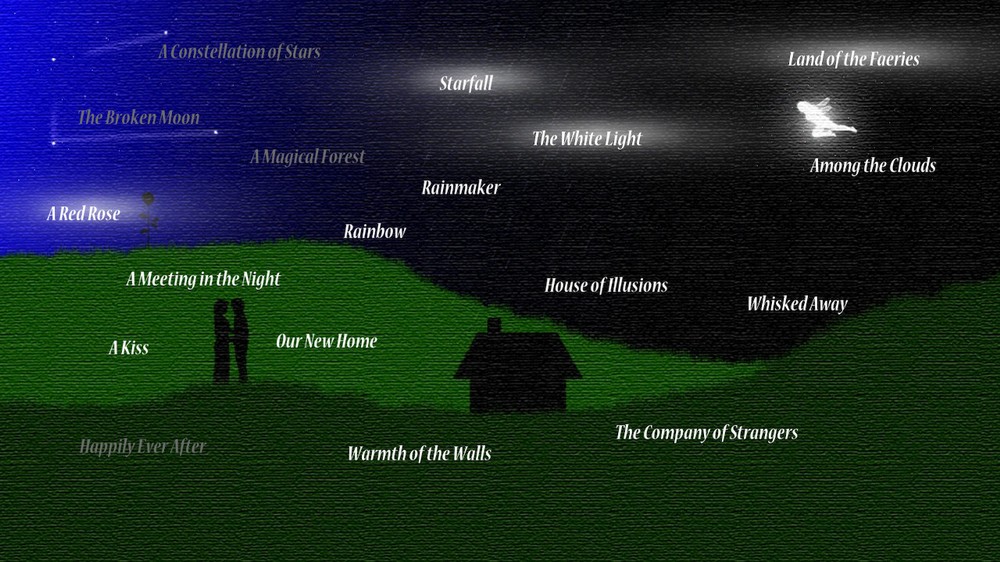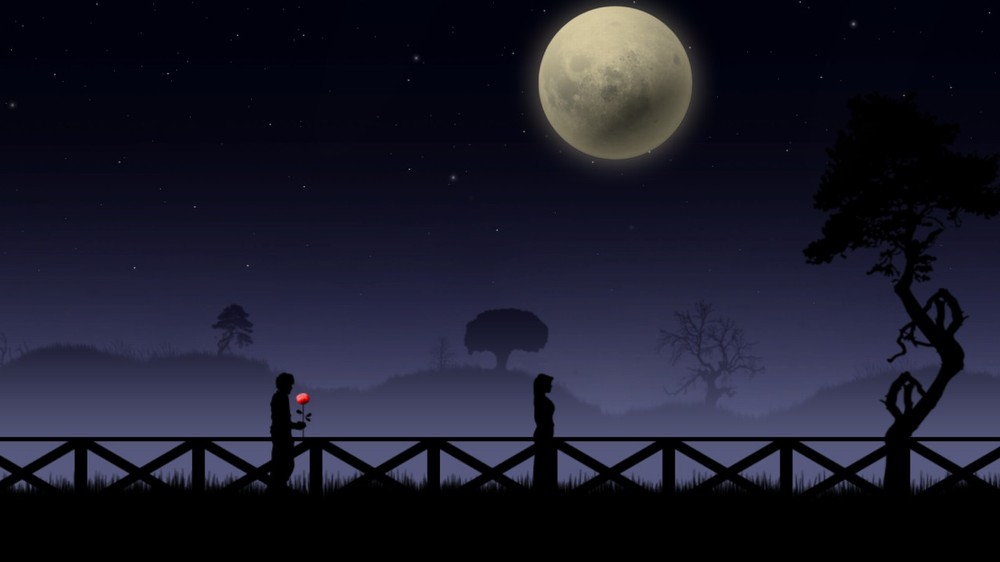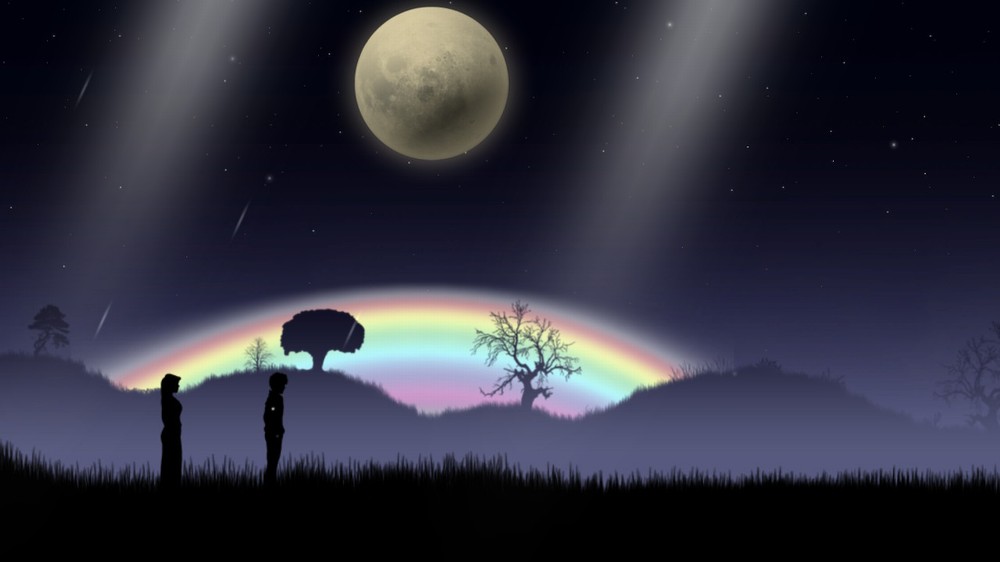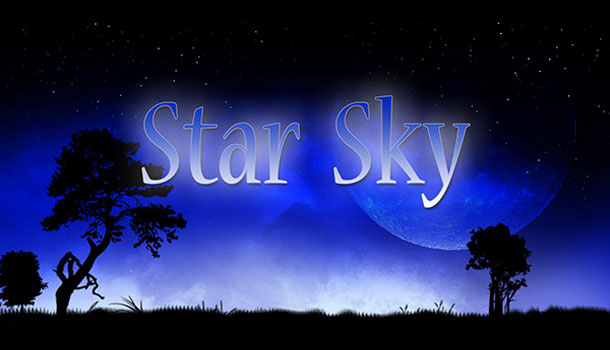Star Sky is an independently developed “interactive experience” that doesn’t quite feel like a game but still has some elements of one. The concept and controls are simple. You’re a fellow going on a little nighttime stroll, and you can sometimes stop to watch some weird happenings. You move your guy along by holding down one button, occasionally releasing the button so you can stop walking to observe something happening. That’s about it. You can choose to run, though the game warns that you’re likely to miss things if you do. Otherwise, however, there’s no jumping or climbing, no going backward, essentially no item collecting or dialogue, no combat, no crafting or shopping, nor other typical interactions we’ve come to expect from a game. There’s just your avatar (a human silhouette moving among other simple black silhouettes against a blue night sky) walking along and perhaps stopping now and then to witness an event.
At times during your walk, you’ll hear an auditory cue, which hints that an event may be about to occur. At these times, you can stop walking, and if your avatar begins to sparkle, you’ll know that the event will actually take place if you stay still and wait patiently. If your guy doesn’t sparkle, you’ll know that an event can take place at that spot, but you didn’t meet the requirements for it to happen this time, so you can move along. That brings me to the choose-your-own-adventure aspect of this game.
 Star Sky is clear about being a slow-paced experience that requires patience to experience fully. You won’t be able to see every event in one playthrough because some events preclude others and some are required to experience others. You’ll probably notice within the first few walks how some of your choices in experiences will affect future events. It is, of course, entirely possible to expect nothing much from this game and simply see how things play out, especially at first. The events do not appear to be randomized, however, and can become quickly repetitive, like re-reading the same choose-your-own-adventure book to try the options you missed the last time. In any case, I’m apparently not laid back enough to go about this experience in a more relaxed way, and I instead spent an evening going through the events systematically and testing which combinations of events unlock which other events.
Star Sky is clear about being a slow-paced experience that requires patience to experience fully. You won’t be able to see every event in one playthrough because some events preclude others and some are required to experience others. You’ll probably notice within the first few walks how some of your choices in experiences will affect future events. It is, of course, entirely possible to expect nothing much from this game and simply see how things play out, especially at first. The events do not appear to be randomized, however, and can become quickly repetitive, like re-reading the same choose-your-own-adventure book to try the options you missed the last time. In any case, I’m apparently not laid back enough to go about this experience in a more relaxed way, and I instead spent an evening going through the events systematically and testing which combinations of events unlock which other events.
For example (and please excuse me, since discussing an example experience of this game necessarily contains some spoilers, and while I’ll try my best to keep it mild, please feel free to skip over the rest of this paragraph if you’re planning on trying Star Sky and don’t want any spoilers at all), there is a house that you may come across during your walk, and depending on which events you experienced before you reach the house, you can end your walk settling down in this house with your sweetheart, partying with strangers, or experiencing something paranormal; however, only one of these events (if any of them) can occur in one playthrough. It looks like there are 18 possible events that you could experience along your walk, and given that the combination of events experienced influences available events later in the walk, there are a great number of possible combinations to try, and after going on walk after walk for this review over the course of one evening, there are still maybe four of those 18 events that I have not seen.
 A single walk seems to generally take anywhere from maybe four to 10 minutes, depending on what you decide to do during your walk and how often you stop. At its best, Star Sky provides a relaxing backdrop of nighttime noises, such as rustling foliage, crickets, and falling rain, managing to capture the peaceful semi-quiet of a calm summer night. The musical portion of the soundtrack is of a monotonous New Age-y variety and not especially inspiring or memorable, but I enjoyed the ambient nocturnal sounds.
A single walk seems to generally take anywhere from maybe four to 10 minutes, depending on what you decide to do during your walk and how often you stop. At its best, Star Sky provides a relaxing backdrop of nighttime noises, such as rustling foliage, crickets, and falling rain, managing to capture the peaceful semi-quiet of a calm summer night. The musical portion of the soundtrack is of a monotonous New Age-y variety and not especially inspiring or memorable, but I enjoyed the ambient nocturnal sounds.
The graphics are simple and mostly black silhouettes without excessive detail. Generally, these graphics are reasonably well animated and serviceable for the simple stories Star Sky conveys, but I found myself wishing that the unusual occurrences were more lushly presented somehow, either musically or visually, if not both, to better evoke the sense of magic I suspect the game intended. Instead, I somehow just didn’t find the various events visually, aurally, or emotionally compelling enough to want to spend additional time figuring out how to unlock the few I missed, and relaxing to the nighttime sounds still didn’t compare favorably to taking a break from the screen and cracking open a window or going out and taking a real nighttime stroll.
 In sum, Star Sky can be a pleasantly relaxing, slow-paced interactive experience if you go into it with an open mind. Ultimately, though, I don’t think it’s really for me. Going for $4.99 as of the time of this writing, it’s not an expensive experience to try, but personally, I’d rather just go for a real walk at no cost and play a more stimulating game when I’m relaxing in front of a screen.
In sum, Star Sky can be a pleasantly relaxing, slow-paced interactive experience if you go into it with an open mind. Ultimately, though, I don’t think it’s really for me. Going for $4.99 as of the time of this writing, it’s not an expensive experience to try, but personally, I’d rather just go for a real walk at no cost and play a more stimulating game when I’m relaxing in front of a screen.











